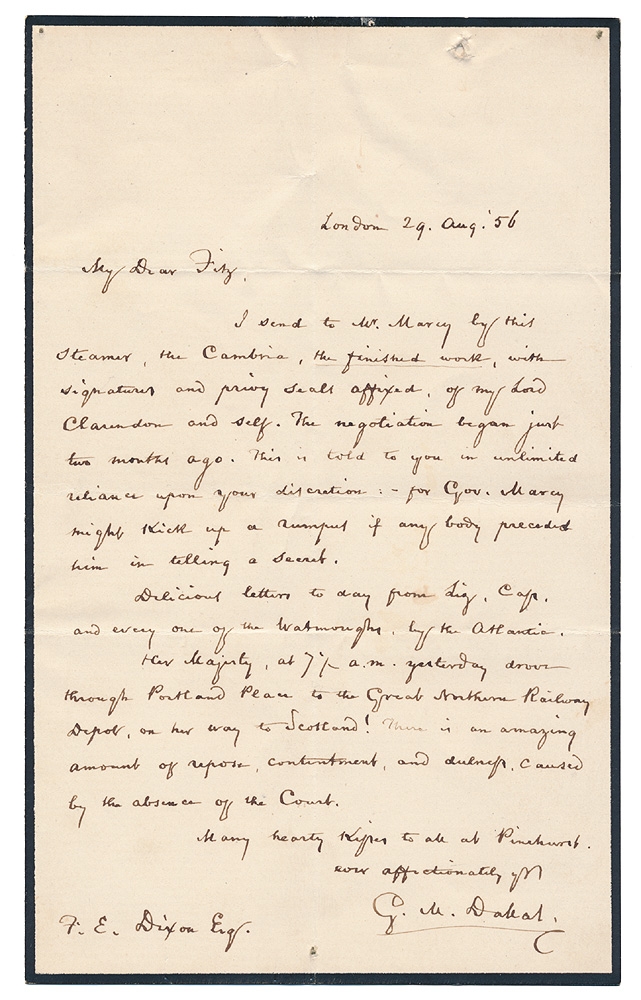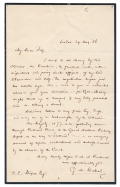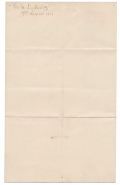site search
online catalog
GEORGE MIFFLIN DALLAS GIVES NOTICE OF THE DALLAS-CLARENDON TREATY WITH BRITAIN- BRITISH INFLUENCE IN THE AMERICAS, U.S. EXPANSIONISM, AND SLAVERY

$125.00 SOLD
Quantity Available: None
Item Code: 766-940
A personal letter written by George Mifflin Dallas (1792-1864,) Vice President under James K. Polk, 1845-1849, and United States Minister to the United Kingdom 1856-1861. Written by hand in ink on the black-bordered front page of a folded writing sheet. The letter is addressed to “Dear Fitz” and at the bottom noted to “”F.E. Dixon, Esq.” It is datelined from London, 29 August 1856, and contains some personal material, but the first and longest paragraph is the most important:
“I send to Mr. Marcy by this steamer, the Cambria, the finished work, with signatures and privy seals affixed, of my Lord Clarendon and self. The negotiation began just two months ago. This is told to you in unlimited reliance upon your discretion- for Gov. Marcy might kick up a rumpus if any body preceded him in telling a secret.”
Dallas here refers to William L. Marcy, Senator and three-time Governor of New York, who was at the time Secretary of State under President Pierce.
The treaty in question was known as the Dallas-Clarendon treaty, and dealt with Britain’s relations to Central and South America, particularly with Honduras. The treaty came to grief in 1857 over concerns about limiting British influence in the region and the desire of some prominent southern politicians to expand slave-holding territory into the Caribbean and Central America: think of movements at the time to annex Cuba or Walker’s filibustering expedition to Nicaragua. In the end, the US senate affixed a number of amendments to the treaty that led to its rejection by the British. Some blamed the outgoing Pierce administration with not energetically pushing the treaty through, and others noted that the treaty accepted that Britain was not unconditionally ceding the Bay Islands to Honduras, potentially giving Britain a naval port. Many suspected, however, that in private discussions among Senators the real reason was that Britain’s treaty with Honduras had excluded slavery from those islands and connected the objectionable amendments to the policies of politicians like Pierre Soule of Louisiana and Jefferson Davis, who had proposed a number of changes to the document.
This is a very telling letter related not just to complex international relations in the mid-1850s, but the role the US saw for itself in the Caribbean and Central America, and the internal stresses of pro-slavery and anti-slavery forces in the United States. [SR]
~~~~~~~~~~~~~~~~~~~~~~~~~~~~~~~~~~~
THIS ITEM, AS WITH ALL OTHER ITEMS AVAILABLE ON OUR WEB SITE,
MAY BE PURCHASED THROUGH OUR LAYAWAY PROGRAM.
FOR OUR POLICIES AND TERMS,
CLICK ON ‘CONTACT US’ AT THE TOP OF ANY PAGE ON THE SITE,
THEN ON ‘LAYAWAY POLICY’.
Inquire About GEORGE MIFFLIN DALLAS GIVES NOTICE OF THE DALLAS-CLARENDON TREATY WITH BRITAIN- BRITISH INFLUENCE IN THE AMERICAS, U.S. EXPANSIONISM, AND SLAVERY
For inquiries, please email us at [email protected]
Most Popular
Historical Firearms Stolen From The National Civil War Museum In Harrisburg, Pa »
Theft From Gravesite Of Gen. John Reynolds »
Cavalry Carbine Sling Swivel »
Fine Condition Brass Infantry Bugle Insignia »
featured item
VERY RARE US MODEL 1840 AMES CAVALRY OFFICER’S SWORD WITH QUILLBACK SOLINGEN BLADE
Very rare Ames with gold washed, quillback, Damascus blade from Solingen. Manufactured: Springfield, MA / Solingen Maker: N.P.Ames Year: C1840s Model: M1840 Size: 33 5/8 inch blade length, 1.18 wide Condition: Excellent+ This is obviously a product… (870-238). Learn More »




